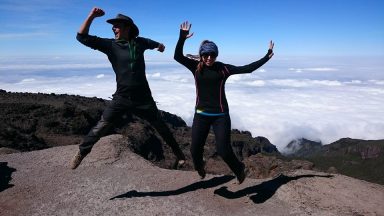Tips From Previous Challengers Pt. 1
Liam Welch, UCL Kilimanjaro 2016
On snacks: “I’d say snacks are important you do potentially go a long time between meals so nuts, protein bars, are a good source of energy- don’t bring dense protein bars that are hard to chew, though. Refrain from eating protein bars on the summit night- these played havoc on my stomach. I’d recommend taking some sweets and chocolate as these sugar hits help increase morale, concentration, and mood which then in-turn increase your likelihood to speak to your peers which again is very important to keep you going knowing you got people supporting you. "
On enjoying the journey: "Another thing I would say as a top tip is enjoy the journey, it’s easy to take yourself away and be alone as you just want to focus on getting to the top but on returning I’ve realised that the best part of the trip wasn’t getting to the top was the laughs and conversations on route up. The journey up with everyone was by far the most meaningful and memorable part for me, so a tip here is let your guards down and open up and talk to your peers as conversations on mountain mean so much more than down here, I often find when I say how are you to someone in day to day life I’m often following up with the next sentence before they even answer but on the mountain you actually care and you actually can feel the care from others so yeah that would be another tip.”
Michelle Fallon, Stirling Kilimanjaro 2015
On drinking water: “My biggest regret was maybe drinking too much water! I know that goes against what they say and for the first 3 nights it was fine, great actually, I avoided altitude sickness pretty well, but by the last day or two, the higher we got the scarcer the land got and the further I had to go during pee breaks to be hidden, meaning I never got a break at all!! so maybe don’t drink quite as much as 4 litres like I was just before summit.”
On thermals: “Also, I’d stress the importance of thermals, I had mine and I was cosy in only them at night (some nights a hoodie, socks and a headband for my ears) but that’s all. Some people in my team didn’t have thermals but thought layering normal clothes would be ok, wrong! they complained of being cold and not getting enough sleep. So wear your thermals!"
Jack Peters, Warwick Kilimanjaro 2016
On Kit: “Go on websites and see what is recommended, then go on amazon and get it for the cheapest possible price. Either sell it on afterward if you bought it new, or buy some parts of your kit second hand."
On training for the challenge: “Walk in your boots at the very least and have a standard level of fitness. I did the three peaks challenge and ran for about 3-5 miles a night every few days for about 2 weeks prior to the trip”
On the trek itself: “It is a very tough mental challenge, but the way I looked at it is one foot in front of the other and you’ll eventually reach the top. It’s key to remember that it is very hard for everyone and as a team, you’ll be able to get through it and reach the top”
Thanks to our lovely participants for passing on their trekking wisdom. Although this advice comes from Kilimanjaro participants, it can all be applied much more broadly to any trek. With these tips and plenty more to come, we hope our participants will have any enjoyable and exciting time preparing and training for their challenge, as well as when participating in the challenge itself.



